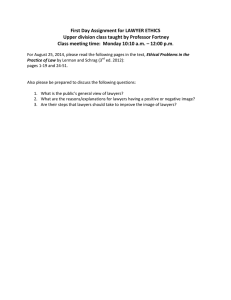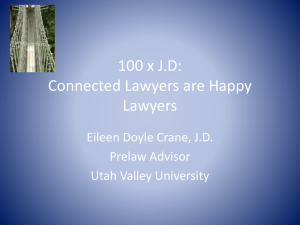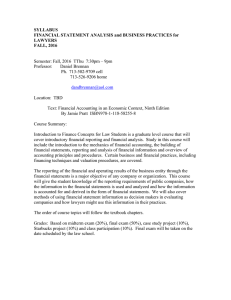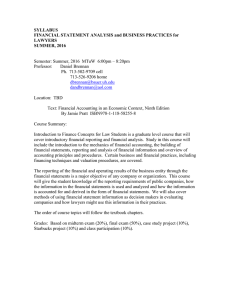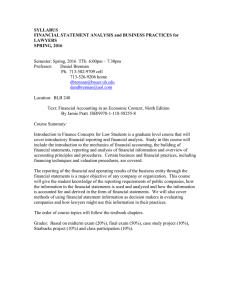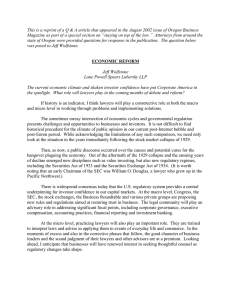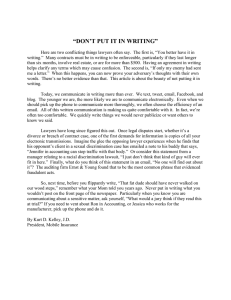Summary of International Standards Concerning
advertisement
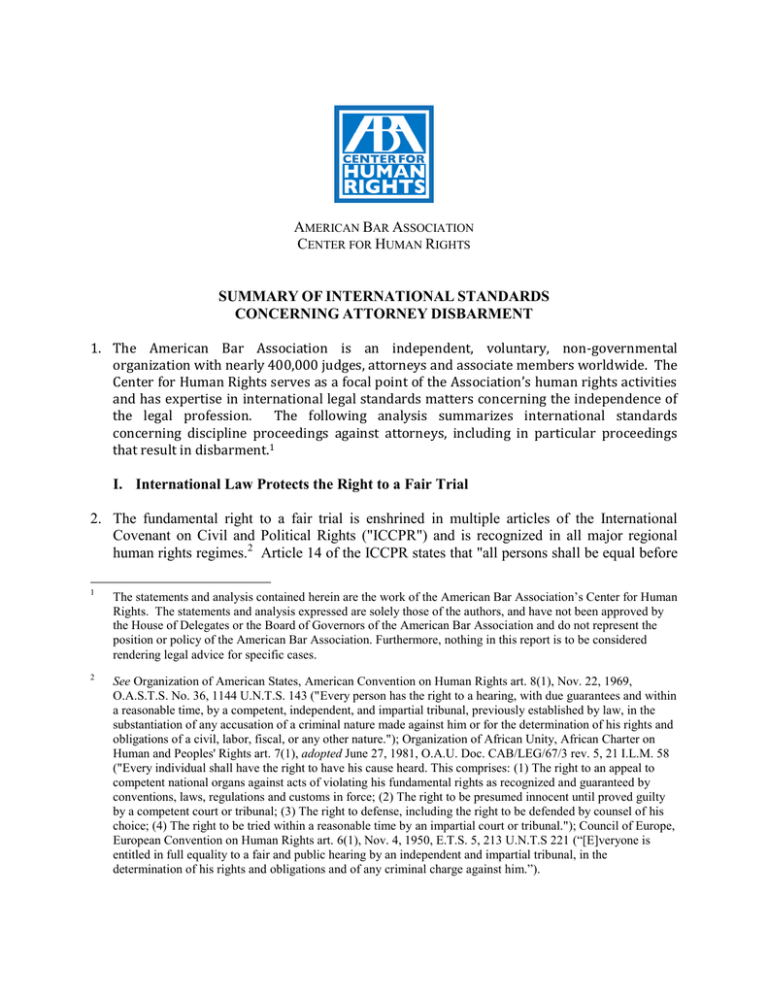
AMERICAN BAR ASSOCIATION
CENTER FOR HUMAN RIGHTS
SUMMARY OF INTERNATIONAL STANDARDS
CONCERNING ATTORNEY DISBARMENT
1. The American Bar Association is an independent, voluntary, non-governmental
organization with nearly 400,000 judges, attorneys and associate members worldwide. The
Center for Human Rights serves as a focal point of the Association’s human rights activities
and has expertise in international legal standards matters concerning the independence of
the legal profession.
The following analysis summarizes international standards
concerning discipline proceedings against attorneys, including in particular proceedings
that result in disbarment.1
I. International Law Protects the Right to a Fair Trial
2. The fundamental right to a fair trial is enshrined in multiple articles of the International
Covenant on Civil and Political Rights ("ICCPR") and is recognized in all major regional
human rights regimes.2 Article 14 of the ICCPR states that "all persons shall be equal before
1
The statements and analysis contained herein are the work of the American Bar Association’s Center for Human
Rights. The statements and analysis expressed are solely those of the authors, and have not been approved by
the House of Delegates or the Board of Governors of the American Bar Association and do not represent the
position or policy of the American Bar Association. Furthermore, nothing in this report is to be considered
rendering legal advice for specific cases.
2
See Organization of American States, American Convention on Human Rights art. 8(1), Nov. 22, 1969,
O.A.S.T.S. No. 36, 1144 U.N.T.S. 143 ("Every person has the right to a hearing, with due guarantees and within
a reasonable time, by a competent, independent, and impartial tribunal, previously established by law, in the
substantiation of any accusation of a criminal nature made against him or for the determination of his rights and
obligations of a civil, labor, fiscal, or any other nature."); Organization of African Unity, African Charter on
Human and Peoples' Rights art. 7(1), adopted June 27, 1981, O.A.U. Doc. CAB/LEG/67/3 rev. 5, 21 I.L.M. 58
("Every individual shall have the right to have his cause heard. This comprises: (1) The right to an appeal to
competent national organs against acts of violating his fundamental rights as recognized and guaranteed by
conventions, laws, regulations and customs in force; (2) The right to be presumed innocent until proved guilty
by a competent court or tribunal; (3) The right to defense, including the right to be defended by counsel of his
choice; (4) The right to be tried within a reasonable time by an impartial court or tribunal."); Council of Europe,
European Convention on Human Rights art. 6(1), Nov. 4, 1950, E.T.S. 5, 213 U.N.T.S 221 (“[E]veryone is
entitled in full equality to a fair and public hearing by an independent and impartial tribunal, in the
determination of his rights and obligations and of any criminal charge against him.”).
the courts and tribunals," and "shall be entitled to a fair trial and public hearing by a
competent, independent, and impartial tribunal established by law."3 Article 14(3)
strengthens this right through the provision of minimum guarantees for criminal defendants,
including:
(b)
To have adequate time and facilities for the preparation of his defense and to
communicate with counsel of his own choosing…;
(d)
To be tried in his presence, and to defend himself in person or through legal
assistance of his own choosing; to be informed, if he does not have legal
assistance, of this right; and to have legal assistance assigned to him, in any case
where the interests of justice so require, and without payment by him in any such
case if he does not have sufficient means to pay for it…;
(e)
To examine, or have examined, the witnesses against him and to obtain the
attendance and examination of witnesses on his behalf under the same conditions
as witnesses against him.4
3. In addition, the ICCPR also recognizes the right to freedom of expression, the restriction of
which can affect the right to a fair trial.5 Article 19(2) of the ICCPR provides that everyone
shall have the right to freedom of expression; this right shall include freedom to seek, receive
and impart information and ideas of all kinds, regardless of frontiers, either orally, in writing
or in print, in the form of art, or through any other media of his
choice
.
II.
The Right to a Fair Trial Depends Upon Access to Counsel Free from Outside
Pressure
4. Lawyers play a central role in protecting the internationally recognized human rights
enshrined in the ICCPR, including the right to a fair trial, as "adequate protection of the
human rights and fundamental freedoms to which all persons are entitled… requires that all
3
United Nations International Covenant on Civil and Political Rights art. 14(1), Dec. 16, 1966, S. TREATY DOC.
No. 95-20, 999 U.N.T.S. 171 [hereinafter ICCPR].
4
Id. art. 14(3).
5
Interpreting language nearly identical to that in the ICCPR, the European Court of Human Rights held that
“interference with counsel's freedom of expression in the course of a trial might raise an issue under Article 6 of
the Convention with regard to the right of an accused client to receive a fair trial.” Steur v. Netherlands, 2003XI Eur. Ct. H.R. 77. The Court has also held that disciplinary proceedings against an attorney for making
statements on behalf of a client violate the right to freedom of expression because they could have a chilling
impact and a harmful impact on the profession. Id. at 77-78.
2
persons have effective access to legal services provided by an independent legal profession."6
In order to be able to carry out their professional duties effectively, lawyers must be free
from improper pressures of any kind, including physical attacks, harassment, corruption, and
other kinds of intimidation. According to the United Nations Human Rights Committee
("Human Rights Committee"), the body charged with authoritative interpretation of the
ICCPR, “[l]awyers should be able to counsel and to represent their clients in accordance with
their established professional standards and judgment without any restrictions, influences,
pressures or undue interference from any quarter.” 7 In its General Comment on the Right to a
Fair Trial under the ICCPR, the Human Rights Committee stated further that “[t]he accused
or his lawyer must have the right to act diligently and fearlessly in pursuing all available
defences and the right to challenge the conduct of the case if they believe it to be unfair.”8
5. The United Nations ("UN") set international standards governing lawyers through the
adoption of the Basic Principles on the Role of Lawyers ("UN Basic Principles") at the
Eighth UN Congress on the Prevention of Crime and the Treatment of Offenders in Havana,
Cuba on 7 September 1990 in order to guarantee the fundamental rights found in the ICCPR.9
The UN Basic Principles require that "lawyers shall at all times maintain the honor and
dignity of their profession as essential agents of the administration of justice."10 Lawyers
shall also advise clients on "their legal rights and obligations, and as to the working of the
legal system in so far as it is relevant to the legal rights and obligations of the clients," assist
their clients "in every appropriate way," and assist their clients "before courts, tribunals, or
administrative authorities, where appropriate."11 While "protecting the rights of their clients
and in promoting the cause of justice," lawyers "shall seek to uphold human rights and
fundamental freedoms recognized by national and international law and shall at all times act
freely and diligently in accordance with the law and recognized standards and ethics of the
6
Eighth United Nations Congress on the Prevention of Crime and the Treatment of Offenders, Havana, Cuba,
Aug. 27-Sept. 7, 1990, Basic Principles on the Role of Lawyers, at Preamble, U.N. Doc A/CONF.144/28/Rev.1
[hereinafter Basic Principles on the Role of Lawyers].
7
Human Rights Committee, General Comment 13, Article 14 (Administration of Justice), ¶ 9, Compilation of
General Comments and General Recommendations Adopted by Human Rights Treaty Bodies, U.N. Doc.
HRI/GEN/1/Rev.1 (1994).
8
Id. at ¶ 11.
9
Although fundamentally a UN document adhering to the ICCPR, the Basic Principles have been found
instructive to other international tribunals tackling fair trial issues, such as the Inter-American Court of Human
Rights and the European Court of Human Rights ("ECHR"). See, e.g., Castillo-Petruzzi et al. v. Peru, Merits,
Reparations and Costs, Judgment, Inter-Am. Ct. H.R. (ser. C) No. 52, ¶ 139 (May 30, 1999) (applying the Basic
Principles as the "proper standards for an adequate defense in criminal cases" when determining a state party
violated Articles 8(2)(b) and 8(2)(c) of the American Convention on Human Rights); Michaud v. France, 2012
Eur. Ct. H.R., at 20 (considering the Basic Principles as part of applicant’s argument on the rights of counsel).
10
Basic Principles on the Role of Lawyers, ¶ 12.
11
Id. ¶ 13.
3
legal profession."12 Ultimately, lawyers "shall always loyally respect the interests of their
clients."13
6. The UN Basic Principles not only set out standards for attorney conduct, they also impose an
affirmative obligation upon Governments to “ensure that lawyers: (a) are able to perform all
of their professional functions without intimidation, hindrance, harassment or improper
interference; (b) are able to travel and to consult with their clients freely both within their
own country and abroad; and (c) shall not suffer, or be threatened with, prosecution or
administrative, economic or other sanctions for any action taken in accordance with
recognized professional duties, standards and ethics.”14 Further, the UN Basic Principles
establish that the lawyers “shall enjoy civil and penal immunity for relevant statements made
in good faith in written or oral pleadings or in their professional appearances before a court,
tribunal or other legal or administrative authority.”15 Protections on the independence of
lawyers are extended to professional bar associations, as lawyers "shall be entitled to form
and join self-governing professional associations to represent their interests, promote their
continuing education and training and protect their professional integrity".16 The UN Special
Rapporteur on the Independence of Judges and Lawyers has continuously stressed that
associations of lawyers need to be independent from the executive branch.17
7. The Human Rights Committee has repeatedly commented on threats to the independence of
lawyers and their professional associations, consistently recommending adherence to the
international standards set out in the UN Basic Principles to ensure compliance with the
ICCPR. In Azerbaijan, the Human Rights Committee requested the state party to address the
conditions on access and membership in the Bar which "may compromise lawyers’ free and
independent exercise of their functions”, as well as the discretion of governmental authorities
over the assignment of judges which would affect their seniority and "may expose judges to
political pressure and jeopardize their independence and impartiality."18 In Libya, the Human
Rights Committee recommended that "measures be taken to ensure full compliance with
article 14 of the {ICCPR} as well as with the United Nations Basic Principles on the
Independence of the Judiciary and the Basic Principles on the Role of Lawyers" in response
12
Id. ¶ 14.
13
Id. ¶ 15.
14
Id. ¶ 16.
15
Id. ¶ 20.
16
Id. ¶ 24.
17
Special Rapporteur on the Independence of Judges and Lawyers, Report on the Independence of Judges and
Lawyers submitted in accordance with Human Rights Council resolution 8/6, ¶ 20, U.N. GAOR, 64th Sess.,
U.N. Doc. A/64/181 (July 28, 2009) (by Leandro Despouy) [hereinafter Report on the Independence of Judges].
18
Human Rights Committee, Concluding Observations of the Human Rights Committee: Azerbaijan 11/12/2001,
¶ 14, U.N. Doc. CCPR/CO/73/AZE, (Nov. 12, 2001).
4
to concerns over the ability for lawyers "to exercise their profession freely, without being in
the employment of the State, and to provide legal aid services."19
8. In 1997, Belarus announced a Presidential Decree on the Activities of Lawyers and
Notaries.20 This Decree dramatically increased governmental control by giving "competence
to the Ministry of Justice for licensing lawyers and obliges them, in order to be able to
practise, to be members of a centralized Collegium controlled by the Ministry".21 In response
to its concerns regarding this Decree, the Human Rights Committee stressed that:
the independence of the judiciary and the legal profession is essential for a sound
administration of justice and for the maintenance of democracy and the rule of
law. The Committee urges {Belarus} to take all appropriate measures, including
review of the Constitution and the laws, in order to ensure that judges and lawyers
are independent of any political or other external pressure. The attention of the
State party is drawn in this connection to the 1985 Basic Principles on the
Independence of the Judiciary and the 1990 Basic Principles on the Role of
Lawyers, adopted by the United Nations General Assembly.22
III.
Disbarment Must Not be Used as a Means to Violate Attorney Independence
9. The malicious prosecution or disbarment of an attorney, or any other form of harassment,
threatens the independence of the legal profession and thereby endangers the right to counsel
set forth in the ICCPR. As the United Nations Commission on Human Rights has explained,
“human rights and fundamental freedoms are all the better safeguarded to the extent the
judiciary and the legal professions are protected from interference and pressure.” 23 Further,
the UN General Assembly has specifically affirmed the right of everyone “individually, and
in association with others … to offer and provide professionally qualified legal assistance or
other relevant advice and assistance in defending human rights and fundamental freedoms.”24
19
Human Rights Committee, Concluding Observations of the Human Rights Committee: Libyan Arab Jamahiriya
11/06/1998 , ¶ 14, U.N. Doc. CCPR/C/79/Add.101 ((Nov. 6, 1998).
20
Human Rights Committee, Report of the Human Rights Committee Volume I, ¶ 150, U.N. GAOR, 53rd Sess.,
Supp. 40, U.N. Doc. A/53/40 (15 September 1998).
21
Id.
22
Id.
23
U.N. Human Rights Committee, Sub-Commission on Prevention of Discrimination and Protection of
Minorities, Report on Independence of the Judiciary and the Protection of Practicing Lawyers, 6, U.N. Doc.
E/CN.4/Sub.2/1993/25 (July 30, 1993) (by Louis Joinet).
24
Declaration on the Right and Responsibility of Individuals, Groups and Organs of Society to Promote and
Protect Universally Recognized Human Rights and Fundamental Freedoms, G.A. Res. 53/144, art. 9, U.N. Doc.
No. A/RES/53/144 (Mar. 8, 1999).
5
10. To ensure compliance with international treaty obligations guaranteeing the right to counsel,
bodies charged with disciplining attorneys must ensure that attorneys are not disbarred or
otherwise disciplined for engaging in activities essential to the effective defense of their
clients. Such activities include but are not limited to: (1) attempting to persuade a judge or
jury of the innocence of their client, (2) bringing good-faith claims in defense of their client,
or (3) objecting to proceedings that may violate the rights of their clients. Attorneys must be
afforded wide discretion to raise all potential claims on behalf of their client to ensure the
integrity of the judicial process. If attorneys are unable to vigorously defend their clients for
fear of disbarment, they will be unable to provide the legal services required to ensure
meaningful access to counsel.
IV.
Disbarment of an Attorney Must be Proportionate and Occur Only When
Necessary in a Democratic Society
11. Attorneys, like all human beings, have a right to freedom of expression.25 Any restriction on
this right, including disbarment for statements made in the course of litigation, must serve a
legitimate purpose that is “necessary in democratic society”. 26 This is particularly true
because such restrictions have the potential to unlawfully deprive criminal defendants of their
right to a fair trial.27 The “special status [of lawyers] gives them a central position in the
administration of justice as intermediaries between the public and the courts.”28 This
position requires reasonable restrictions on the conduct of members of the Bar. It is,
therefore, legitimate to expect lawyers to contribute to the proper administration of justice,
and thus to maintain public confidence therein,29 provided that such restrictions do not
threaten the independence of the legal profession or the right to counsel. Any restrictions on
legal advocacy must be proportional to that legitimate purpose.30
25
ICCPR, art. 19; see also Basic Principles on the Role of Lawyers, ¶ 23.
26
The test of “necessity in a democratic society” requires the Court to determine whether the interference
complained of corresponded to a “pressing social need”. The Contracting States have a certain margin of
appreciation in assessing whether such a need exists, but it goes hand in hand with European supervision,
embracing both the legislation and the decisions applying it, even those delivered by an independent court. See
Tromsø and Stensaas v. Norway, 1999-III Eur. Ct. H.R. 289, 321-22; Cumpǎnǎ and Mazǎre v. Romania, 2004XI Eur. Ct. H.R. 63, 89; Nikula v. Finland, 2002-II Eur. Ct. H.R. 292, 310.
27
See, e.g., Steur v. Netherlands, 2003-XI Eur. Ct. H.R. 68, 77 (“The special duties of lawyers led the Court to
conclude . . .that in certain circumstances, an interference with counsel’s freedom of expression in the course of
a trial might raise an issue under Article 6 of the [European] Convention with regard to the right of an accused
client to receive a fair trial.”) (citing Nikula, 2002-II Eur. Ct. H.R. at 309-10).
28
Casado Coca v. Spain, 285 Eur. Ct. H.R. (ser. A), ¶ 54 (1994), available at
http://hudoc.echr.coe.int/webservices/content/pdf/001-57866?TID=gphvuxinuo.
29
See Amihalachioaie v. Moldova, 2004-III Eur. Ct. H.R. 197; Nikula, 2002-II Eur. Ct. H.R. 292, at 309-310.
30
Ezelin v. France, 202 Eur. Ct. H.R. (ser. A) ¶ 38 (1991), available at
http://hudoc.echr.coe.int/webservices/content/pdf/001-57675?TID=dyetbtytrf (holding that disciplining of
lawyer for failure to disassociate himself from unruly protests was disproportional).
6
12. When deciding cases on disbarment, the courts have to ensure that the severe penalty of
disbarment is necessary to achieve legitimate interests such as the proper administration of
justice. If a less severe and hence more narrowly tailored remedy, such as sanctions, will
achieve the legitimate aim of the regulation, it should be adopted in place of disbarment. The
European Court of Human Rights, interpreting provisions of the European Convention (the
“European Convention”) on the right to freedom of expression nearly identical to that in the
ICCPR, ruled in Kudeshkina v. Russia that the dismissal of a Russian judge, who was
disciplined by the State because she expressed a critical opinion of the judiciary, violated the
judge’s right to freedom of expression.31 The courts noted that the fear of sanctions could
have a “chilling effect” on the exercise of freedom of expression and that this effect, “which
works to the detriment of society as a whole, is likewise a factor which concerns the
proportionality of, and thus the justification for the sanctions imposed on the applicant. . .”32
13. Courts hearing disbarment cases decide more than the direct issue at hand; they also weigh
whether any punishment, up to and including disbarment, would violate the attorney’s human
rights and erode the legitimacy of the justice system. If punishment would have these
negative effects, courts often nullify them. In Kyprianou v. Cyprus, the European Court of
Human Rights interpreted a freedom of expression provision in the European Convention
that is similar to Article 19(2) of the ICCPR.33 The Court found that even a “lenient criminal
penalty” imposed on a defense attorney who used heated language in objecting to the court’s
procedures during an adversarial criminal trial violated the attorney’s human rights and
fostered a “chilling effect” on the practice of the legal profession.34 As such, the Court held
that even the light criminal penalty imposed on the attorney for his outburst would reduce
public confidence in the ability of the Cypriot courts and of the legal profession to administer
justice.35
14. When an attorney faces discipline for conduct that is part of a zealous client representation,
international courts have struck down penalties, ranging from disbarment36 to the more
lenient of punishments, as violations of the attorney’s human rights. In Steur v. Netherlands,
31
Kudeshkina v. Russia, 2009 Eur. Ct. H.R, ¶ 102, available at
http://hudoc.echr.coe.int/webservices/content/pdf/001-91501?TID=abdmcgoqdk.
32
Id. ¶ 99.
33
Kyprianou v. Cyprus, 2005-XII Eur. Ct. H.R. 48.
34
Id. at 95.
35
Id.
36
See Kabanov v. Russia, 2011 Eur. Ct. H.R., ¶¶ 54-59, available at
http://hudoc.echr.coe.int/webservices/content/pdf/001-103222?TID=gfhamiicwm. In Kabanov, the European
Court of Human Rights considered the case of an attorney disbarred after accusing two judges of corruption and
incompetence for refusing to reinstate him in a case from which he was removed. The Court found that in
disbarring the attorney, the Russian authorities had incorrectly balanced the need to protect the judiciary and the
need to protect freedom of expression enshrined in the provision of the European Convention analogous to
Article 19(2) of the ICCPR . Disbarment was “disproportionate” for conduct within the scope of the attorney’s
representation.
7
the European Court of Human Rights considered the case of a Dutch lawyer who, on his
client’s behalf, officially accused an investigating officer of misconduct in evidence
collection.37 Following this accusation, the investigating officer brought a disciplinary
complaint against the lawyer to a local bar association, and the relevant disciplinary council
upheld the complaint while imposing no additional sanctions.38 The Court found that even
without sanctions, the mere recognition of a disciplinary complaint against an attorney for
conduct falling within the scope of representation violated the attorney’s human rights under
a provision of the European Convention analogous to Article 19(2) of the ICCPR.39
15. Of course, the government has a legitimate interest to ensure the proper administration of
justice. Thus, lawyers’ freedom of expression in the courtroom is not unlimited and such
interests are important enough to justify restrictions on this right. However, the European
Court of Human Rights has held that it is only in exceptional circumstances that such
restrictions – even by way of a lenient criminal penalty –can be accepted as necessary in a
democratic society.40
V.
Disbarment Proceedings Against an Attorney Must Be Fair and Impartial
16. The fair trial requirements of the ICCPR apply to disciplinary proceedings against lawyers
for alleged violations of professional standards.41 This right is reinforced in the UN Basic
Principles, which state that "{l}awyers shall have the right to a fair hearing, including the
rights to be assisted by a lawyer of their choice", and that "{c}harges or complaints made
against lawyers in their professional capacity shall be processed expeditiously and fairly
under appropriate procedures."42
17. The UN Basic Principles state that “all disciplinary proceedings shall be determined in
accordance with the code of professional conduct and other recognized standards and ethics
of the legal profession and in the light of these principles”. 43 Codes of professional conduct
37
Steur v. Netherlands, 2003-XI Eur. Ct. H.R. 68.
38
Id. at 72-74.
39
Id. at 78.
40
See Nikula v. Finland, 2002-II Eur. Ct. H.R. 292, 312.
41
ICCPR, art. 14. The Human Rights Committee has stated that Art. 14(1) applies to civil as well as criminal
proceedings and “must be respected whenever domestic law entrusts a judicial body with a judicial task.”
Human Rights Committee, General Comment No. 32, Article 14: Right to equality before courts and tribunals
and to a fair trial, ¶ 7, U.N. Doc. CCPR/C/GC/32 (2007) (citing Communication No. 1015/2001, Perterer v.
Austria, para. 9.2 (disciplinary proceedings against a civil servant); Communication No. 961/2000, Everett v.
Spain, para. 6.4 (extradition)). The Committee has specifically stated that the discipline of judge must satisfy
the requirements of Art. 14 with the result that “[j]udges may be dismissed only on serious grounds of
misconduct or incompetence, in accordance with fair procedures ensuring objectivity and impartiality set out in
the constitution or the law.” Id. ¶ 20.
42
Basic Principles on the Role of Lawyers, ¶ 27.
43
Id. ¶ 29.
8
should be drafted by associations of lawyers or, in case they are established by law, with the
input of these associations. In this respect, the UN Basic Principles state that “codes of
professional conduct for lawyers shall be established by the legal profession through its
appropriate organs or by legislation, in accordance with national law and custom and
recognized international standards and norms”.44
18. The UN Basic Principles also contain certain basic requirements to be followed in
disciplinary proceedings against lawyers so that they conform to international law. According
to the UN Basic Principles, disciplinary proceedings against lawyers shall be brought before
an impartial disciplinary committee established by the legal profession, before an
independent statutory authority, or before a court.45 Thus, the body in charge should be free
from any influence or pressure from the legislative or the executive branches of power or any
other party. Ideally, disciplinary bodies should be established by the legal profession itself.
Further, in the view of the Special Rapporteur, no withdrawal of licenses should take place
without the prior consent of the relevant lawyers’ association46 and any formal decision
should be subject to judicial review.47
19. The Human Rights Committee shares these concerns. In their concluding observations on
the Sixth Periodic Report on the Russian Federation, the Human Rights Committee warned
Russia that a proposed bill which would "enable the State Registration Agency to remove a
lawyer's license to practice through a court action without prior approval" of the Russian
lawyer's association could have a significant impact "on the independence of the legal
profession and the right to a fair trial as stipulated in Article 14 of the {ICCPR}."48 The
Human Rights Committee urged Russia to review the compatibility of this proposed law with
Russia's obligations under the ICCPR and the Basic Principles on the Role of Lawyers in
order to "refrain from taking any measures that constitute harassment or persecution of
lawyers and unnecessarily interfere with their defense of clients."49 The UN Committee
against Torture likewise “expressed concern at the subordination of lawyers to the control of
the Ministry of Justice….”50
44
Id. ¶ 26.
45
Id. ¶ 28.
46
U.N. Special Rapporteur on the Independence of Judges and Lawyers, Addendum to the Report on the
Independence of Judges and Lawyers: Mission to the Russian Federation, ¶¶ 79, 101, U.N. Doc.
A/HRC/11/41/Add.2. (by Leandro Despouy).
47
Report on the Independence of Judges, supra note 17,,¶ 20.
48
Human Rights Committee, Report of the Human Rights Committee Volume I, 41, U.N. GAOR, 65th Sess., Supp.
40, U.N. Doc. A/53/40 (15 September 1998).
49
Id.
50
UN Special Rapporteur, Report A/56/44, para. 45 (g).
9
20. In addition, courts outside of the UN system have found that disciplinary actions against
lawyers taken without sufficient standards of due process to ensure fair and impartial trials
violate international human rights norms. In H v. Belgium, the European Court of Human
Rights considered the application of a Belgian lawyer who sought reinstatement to his local
bar but was summarily denied reinstatement two times by the local bar association. 51 Despite
the fact that the applicant was represented by an attorney in his reinstatement proceedings,
the Court found that the attorney had not been afforded sufficient process to protect his rights
under Article 6 of the European Convention.52 This was because the attorney was unable to
adduce evidence which might have brought about his reinstatement and because he had cause
to “fear that there was some risk of being dealt with arbitrarily, especially as there was no
provision allowing him a right of challenge.”53
21. At a minimum, to ensure that disciplinary proceedings meet basic fair trial standards, they
must not be controlled by entities that have a conflict of interest. For example, government
agencies charged with litigation responsibilities, such as the Ministry of Justice in many
countries, could not serve as an adjudicator of disciplinary proceedings as they would have
an inherent conflict of interest in dealing with misconduct allegedly committed by attorneys
who may serve as opposing counsel in litigation involving that agency. While government
agencies may have a role in certain disciplinary proceedings, courts reviewing disciplinary
proceedings should weigh the views of such agencies in light of potential conflicts of
interest. Conversely, the views of independent professional organizations should be given
full consideration. At a minimum, disbarment proceedings would not be considered fair and
impartial if they that relied exclusively or substantially upon the views or factual assertions
of a government agency or failed to give full consideration to the views of independent bar
associations.
VI.
Conclusion
22. Courts must ensure that attorneys are not disbarred or otherwise disciplined for engaging in
activities required to properly defend their client, such as advocating in good-faith for their
client’s innocence, presenting all reasonable claims on behalf of their client and objecting to
proceedings that may violate their clients rights. Attorneys should be afforded wide
discretion to advocate on behalf of their clients to ensure public confidence in the legitimacy
of judicial processes. The right to freedom of expression must be respected and attorneys
should only be disciplined for statements made in the course of litigation under exceptional
circumstances where necessary for a compelling interest that could not be served by less
51
H v. Belgium, 127 Eur. Ct. H. R. (ser. B), ¶¶ 53-55 (1987), available at
http://hudoc.echr.coe.int/webservices/content/pdf/001-57501?TID=wchamsesyv.
52
Like the ICCPR, Article 6 of the European Convention on Human Rights protects the human right of all person
to a fair trial, including lawyers. Compare ICCPR, art. 14 with European Convention on Human Rights, art.
6(1), Sept. 3, 1953, E.T.S. 5, 213 U.N.T.S 221. See also Basic Principles on the Role of Lawyers, ¶ 27.
53
H v. Belgium, ¶ 53.
10
restrictive means. Finally, discipline proceedings must be administered by an impartial
tribunal. The views of independent bar associations should be given due weight in such
proceedings and the views of governmental agencies with potential conflicts of interest
should be weighed accordingly.
11
